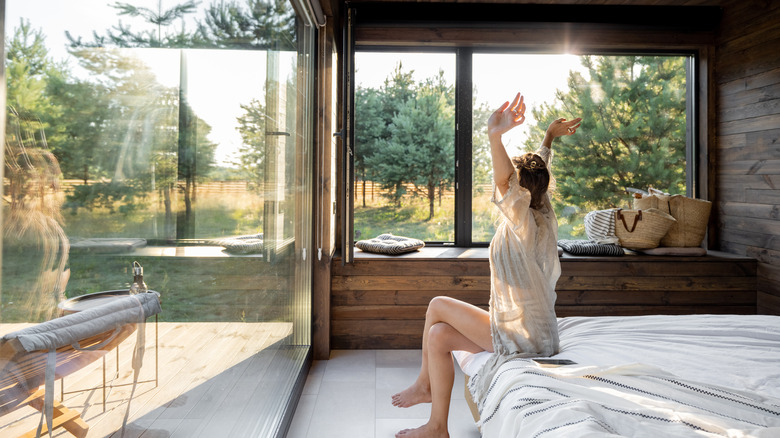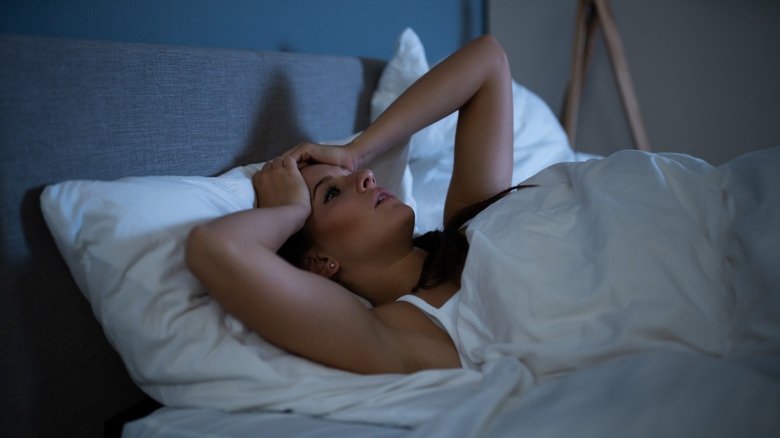A Little Extra Sunshine Might Be The Simple Fix For Your Sleep Problems
Sleep is pretty important to your health, as National Institutes of Health News in Health explains, but some people overlook it. They don't think twice about staying out late and getting a few hours of sleep. Others struggle to get quality sleep because of a newborn in the house or a shift work schedule. However, noise and irregular sleep schedules aren't the only things that can interfere with a good night's sleep; limited daylight can be a hindrance, too.
According to the Centers for Disease Control and Prevention, "The light/dark cycle of the sun has a powerful effect on the circadian clock, sleep, and alertness," but in late fall, the days start to get noticeably shorter, leaving us with less daylight each day until the winter solstice (December 21 or 22). During this time, many people wake up for work before sunrise and leave the office after sunset, so they don't get to experience much sunshine throughout the day.
WebMD claims limited sunlight exposure can affect your sleep schedule as well as the quality of sleep. In the same vein, evidence suggests that getting more sunlight exposure, especially in the morning, can improve your sleep quality.
How the sun affects the sleep-wake cycle
Before understanding how the sun affects sleep, it's important to understand circadian rhythms and the sleep-wake cycle. Sleep Foundation defines circadian rhythms as "24-hour cycles that are part of the body's internal clock," and apparently, "the most important and well-known circadian rhythms is the sleep-wake cycle."
For most people, the "wake" part of the cycle occurs in the morning hours. When the eyes are exposed to sunlight, it triggers the brain to release serotonin, which is a hormone that promotes wakefulness, as the National Library of Medicine explains. Because of this, serotonin can be thought of as the daytime hormone.
The "sleep" part of the cycle involves another hormone called melatonin, which can be thought of as the nighttime hormone. According to an Environmental Health Perspectives study, its levels increase as daylight levels decrease. When melatonin is released in the brain, the body enters a "state of quiet wakefulness that helps promote sleep," according to Dr. Luis F. Buenaver, a sleep expert at Johns Hopkins (via PBS North Carolina). SelectHealth claims this variation in melatonin levels is how sunlight regulates circadian rhythms.
Less sunlight can disrupt the sleep-wake cycle
Research finds that if the eyes are exposed to sunlight later than usual in the morning, such as in the late fall and winter, it can negatively affect the sleep cycle. According to a study that involved over 500 college students, the limited daylight hours of winter caused students to fall asleep later than in the summer. However, Horacio de la Iglesia, a professor of biology at the University of Washington, told WebMD that taking a quick walk in the morning can help reset your circadian clock.
In another study that focused on office employees, one group of people were exposed to a certain amount of morning sunlight while another group was exposed to less. The first group was able to fall asleep faster and had less disturbances than the second group. Researchers found similar results with employees who were exposed to high levels of sunlight throughout their work day.
The National Library of Medicine claims exposure to sunlight or "very bright artificial light in the morning" results in an earlier production of melatonin than late-morning or afternoon exposure. As a result, it will be easier for you to fall asleep at night. So, if you're having trouble sleeping during the late fall or winter months, getting a little extra sunshine might be the solution.


